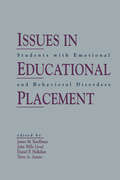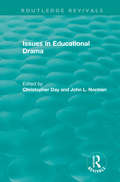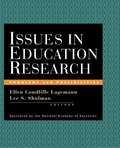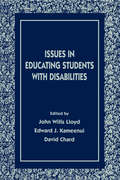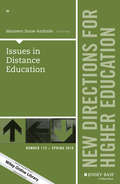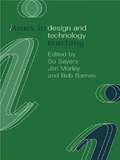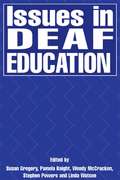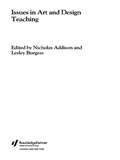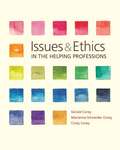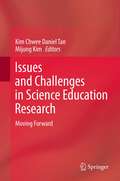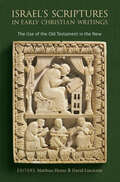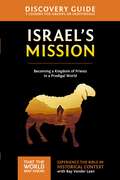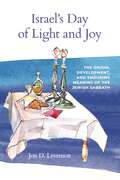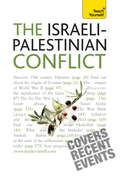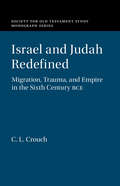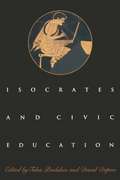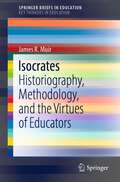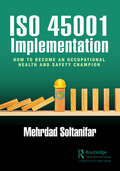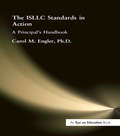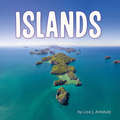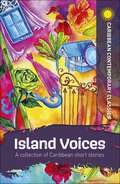- Table View
- List View
Issues in Educational Placement: Students With Emotional and Behavioral Disorders
by James M. Kauffman John Wills Lloyd Daniel P. Hallahan Terry A. AstutoPlacement of students with disabilities in the least restrictive environment has become a central issue in special education. To date, no comprehensive treatment of placement issues is available, especially for students with emotional and behavioral disorders who present particularly difficult placement problems. This book combines data and discussions intended to further the understanding of how and why decisions are made to place students with emotional or behavioral disorders in particular educational environments. This volume establishes the problem of placement in a contemporary and historical context, reviews the literature on placement of students with emotional or behavioral disorders, and discusses placement options and concerns about multicultural issues, post-secondary education, law and regulation, demands on teachers, and policy choices. Its goals are to: * improve understanding of decision processes leading to placement, * set the stage for improvements in pupils' lives in school and elsewhere, and * stimulate research on the many placement issues that are left unresolved.
Issues in Educational Drama (Routledge Revivals)
by Christopher Day and John L. NormanPublished in 1983, this book is a collection of original papers which explore concerns in the teaching of drama in education. All chapters have been written by significant practitioners of drama in education and attempt to locate the growing understanding of the educational drama process in the real world of schooling. Thus the collection sets out to identify and explore the many social, economic and ideological factors which influence the status and development of drama and propose strategies by which the work might be better established.
Issues in Education Research: Problems and Possibilities
by Ellen Condliffe Lagemann Lee S. ShulmanThis comprehensive volume provides and overview of the tensions, dilemmas,issues and possibilities that currently characterize education research.
Issues in Educating Students With Disabilities (The LEA Series on Special Education and Disability)
by John Wills Lloyd Edward J. Kameenui David ChardThe contributors to this volume represent the most prominent researchers and thinkers on issues in educating students with and without disabilities. The book captures the most current thinking, research, and analysis on the full range of issues in educating students with learning disabilities, from its definition to the most recent case law and interpretations of federal law on educating these students in the general education classroom. The contributors' words speak sufficiently, mellifluously, and exactingly about their contributions to the education of all students, in particular those with disabilities. This book of essays was written to pay tribute to Barbara D. Bateman, who -- along with Sam Kirk -- coined the term "learning disabilities." Its content reflects the significance of her contributions to the field of special education.
Issues in Distance Education: New Directions for Higher Education, Number 173
by Maureen Snow AndradeIn this environment of disruptive technological change, higher education institutions must determine whether they will develop and offer technology-supported, hybrid, or online courses and degrees, which courses and degrees, how many, for whom, and for what purpose. They must make decisions about development models and design, processes, costs, and student and faculty support. In this volume, the authors explore the current and future practice of distance education in higher education institutions, including: developing an initial infrastructure to support course design and development, revitalizing existing structures and processes for distance education, and cutting-edge practices that innovate and lead the field. These topics help guide decision makers as they determine appropriate responses to distance learning opportunities. This is the 173rd volume of the Jossey-Bass quarterly report series New Directions for Higher Education. Addressed to presidents, vice presidents, deans, and other higher education decision makers on all kinds of campuses, it provides timely information and authoritative advice about major issues and administrative problems confronting every institution.
Issues in Design and Technology Teaching (Issues in Teaching Series)
by Bob Barnes Jim Morley Su SayersIssues in Design and Technology Teaching identifies and examines the important concerns in this subject, seeking to challenge preconceptions and stimulate debate about this relative newcomer to the National Curriculum. Key areas addressed are: Issues of Definition: getting to the roots of the concept of design and its educational value Issues in the Classroom: the role and implementation of new technologies, and issues involved in planning and assessment Issues in the School Context: gender as a concern in Design and Technology, with an examination of boys' performance in this area Issues Beyond the School: ethics, values and attitudes in Design and Technology, and a discussion of the benefits of partnerships with industry. Issues in Design and Technology Teaching provides support for student teachers and NQTs in primary and secondary schools, helping them to reach informed judgements about the subject they are teaching.
Issues in Deaf Education
by Ruth SwanwickThe way in which education is provided for deaf children is changing, as are the demands made on teachers, both in special settings and in mainstream schools. This book offers a comprehensive account of recent research and current issues in educational policy, psychology, linguistics and audiology, as they relate to the education of the deaf and includes detailed information about further reading. It should be of interest to student teachers and teachers of the deaf, teachers in mainstream schools, academics working in the area of deafness and disability, audiologists and cochlear implant teams, parents of deaf children, and members of the deaf community.
Issues in Art and Design Teaching
by Nicholas Addison Lesley BurgessIssues in Art and Design Teaching draws together a range of pedagogical and ethical issues for trainee and newly qualified teachers of art and design, and their mentors in art and design education. Arguing for a critical approach to the art and design curriculum, the collection encourages students and teachers to consider and reflect on issues in order that they can make reasoned and informed judgments about their teaching of art and design.Among the key issues addressed include: challenging orthodoxies and exploring contemporary practices measuring artistic performance art history and multicultural education research in art and design education transitions in art and design education: primary/secondary and secondary/tertiary the role of art and design in citizenship education.
Issues, Evidence and You Student Book
by Sepup Lawrence Hall of ScienceIssues, Evidence and You (IEY) uses several kinds of activities to teach science. For example, you will design and conduct an experiment to determine the amount of acid in simulated industrial waste water. You will investigate the chemical and physical properties of plastics and other common materials. And you will apply what you have learned about energy and materials to design an energy-efficient car.
Issues and Ethics in the Helping Professions (10th Edition)
by Gerald Corey Marianne Schneider Corey Cindy CoreyUp-to-date and comprehensive, this practical best seller provides students with the basis for discovering their own guidelines for helping within the broad limits of professional codes of ethics and divergent theoretical positions. Respected authors Gerald Corey, Marianne Corey, and Cindy Corey raise what they consider to be central issues, present a range of diverse views on the issues, discuss their position, and provide opportunities for students to refine their thinking and develop an informed position. With new material in every chapter and an emphasis on critical thinking, Issues and Ethics in the Helping Professions, 10th Edition, is useful for students as well as practicing professionals.
Issues and Challenges in Science Education Research
by Mijung Kim Kim Chwee TanIn contemporary society, science constitutes a significant part of human life in that it impacts on how people experience and understand the world and themselves. The rapid advances in science and technology, newly established societal and cultural norms and values, and changes in the climate and environment, as well as, the depletion of natural resources all greatly impact the lives of children and youths, and hence their ways of learning, viewing the world, experiencing phenomena around them and interacting with others. These changes challenge science educators to rethink the epistemology and pedagogy in science classrooms today as the practice of science education needs to be proactive and relevant to students and prepare them for life in the present and in the future. Featuring contributions from highly experienced and celebrated science educators, as well as research perspectives from Europe, the USA, Asia and Australia, this book addresses theoretical and practical examples in science education that, on the one hand, plays a key role in our understanding of the world, and yet, paradoxically, now acknowledges a growing number of uncertainties of knowledge about the world. The material is in four sections that cover the learning and teaching of science from science literacy to multiple representations; science teacher education; the use of innovations and new technologies in science teaching and learning; and science learning in informal settings including outdoor environmental learning activities. Acknowledging the issues and challenges in science education, this book hopes to generate collaborative discussions among scholars, researchers, and educators to develop critical and creative ways of science teaching to improve and enrich the lives of our children and youths.
Israel's Scriptures in Early Christian Writings: The Use of the Old Testament in the New
by Matthias Henze and David Lincicum, eds.How did New Testament authors use Israel&’s Scriptures? Use, misuse, appropriation, citation, allusion, inspiration—how do we characterize the manifold images, paraphrases, and quotations of the Jewish Scriptures that pervade the New Testament? Over the past few decades, scholars have tackled the question with a variety of methodologies. New Testament authors were part of a broader landscape of Jewish readers interpreting Scripture. Recent studies have sought to understand the various compositional techniques of the early Christians who composed the New Testament in this context and on the authors&’ own terms. In this landmark collection of essays, Matthias Henze and David Lincicum marshal an international group of renowned scholars to analyze the New Testament, text-by-text, aiming to better understand what roles Israel&’s Scriptures play therein. In addition to explicating each book, the essayists also cut across texts to chart the most important central concepts, such as the messiah, covenants, and the end times. Carefully constructed reception history of both testaments rounds out the volume. Comprehensive and foundational, Israel&’s Scriptures in Early Christian Writings will serve as an essential resource for biblical scholars for years to come. Contributors: Garrick V. Allen, Michael Avioz, Martin Bauspiess, Richard J. Bautch, Ian K. Boxall, Marc Zvi Brettler, Jaime Clark-Soles, Michael B. Cover, A. Andrew Das, Susan Docherty, Paul Foster, Jörg Frey, Alexandria Frisch, Edmon L. Gallagher, Gabriella Gelardini, Jennie Grillo, Gerd Häfner, Matthias Henze, J. Thomas Hewitt, Robin M. Jensen, Martin Karrer, Matthias Konradt, Katja Kujanpää, John R. Levison, David Lincicum, Grant Macaskill, Tobias Nicklas, Valérie Nicolet, Karl-Wilhelm Niebuhr, George Parsenios, Benjamin E. Reynolds, Dieter T. Roth, Dietrich Rusam, Jens Schröter, Claudia Setzer, Elizabeth Evans Shively, Michael Karl-Heinz Sommer, Angela Standhartinger, Gert J. Steyn, Todd D. Still, Rodney A. Werline, Benjamin Wold, Archie T. Wright
Israel's Mission Discovery Guide: A Kingdom of Priests in a Prodigal World (That the World May Know)
by ZondervanJoin renowned teacher and historian Ray Vander Laan as he travels through the land of the Bible. In each lesson, Vander Laan illuminates the historical, geographical, and cultural context of the sacred Scriptures. Filmed on location in Israel, the That the World May Know video series transforms participants’ understanding of God and challenges them to be a true follower of Jesus.The That the World May Know video Bible study series is ideal for use by pastors and small group leaders, as well as anyone interested in deeper, biblical learning.Designed for use with the Israel’s Mission Video Study (sold separately).
Israel’s Day of Light and Joy: The Origin, Development, and Enduring Meaning of the Jewish Sabbath
by Jon D. LevensonThis book begins by exploring the mysterious origins of an institution so familiar that most of us never wonder where it came from—the seven-day week. Jon D. Levenson then focuses on the historical development of the Jewish Sabbath and the rich range of theological and ethical meanings it has acquired over the centuries.Levenson evaluates the theory that the Hebrew word šabbāt derives from Akkadian and that the Sabbath may have begun as a day of ill omen, only later to be reinterpreted as the joyous festival that consummates the seven-day week. He explores the quasi-magical character of the number seven in ancient Near Eastern and Mediterranean compositions and examines the revealing variation of the Sabbath commandment between the two biblical versions of the Decalogue in Exodus and Deuteronomy. He also treats sabbatical law in the Second Temple and rabbinic periods, critiquing contemporary efforts to extract a spirituality from the Sabbath that is divorced from larger questions of communal identity, normative practice, and religious affirmation. Levenson concludes by discussing modern challenges to Sabbath observance and the surprising prospects for its continuation.Written by an eminent scholar in the field, this sophisticated inquiry bridges the gap between studies that explore the spiritual meaning of Jewish Sabbath observance and those that focus strictly on the history of the tradition. It will appeal to a wide audience of academics and lay readers.
The Israeli-Palestinian Conflict: Teach Yourself (Teach Yourself Educational)
by Stewart RossUnderstand the Israeli-Palestinian Conflict is the essential guide to one of the world's most distressing confrontations. Putting the present situation into its broader context and examining all perspectives, it unravels the origins and development of issues which make the headlines daily. Each aspect of this complex conflict is explained with engaging objectivity which will ensure you can examine the issues from all perspectives and in a social, political, historical and international framework.NOT GOT MUCH TIME?One, five and ten-minute introductions to key principles to get you started.AUTHOR INSIGHTSLots of instant help with common problems and quick tips for success, based on the author's many years of experience.EXTEND YOUR KNOWLEDGEExtra online articles at www.teachyourself.com to give you a richer understanding.FIVE THINGS TO REMEMBERQuick refreshers to help you remember the key facts.TRY THISInnovative exercises illustrate what you've learnt and how to use it.
Israel in Agony
by Zola LevittIn this dramatic story of the agony of Israel, Jewish Christian prophecy analyst, Zola Levitt, takes a penetrating look at the world situation, the Bible, and the Promised Land.
Israel and Judah Redefined: Migration, Trauma, and Empire in the Sixth Century BCE (Society for Old Testament Study Monographs)
by C. L. CrouchIn Israel and Judah Redefined, C. L. Crouch uses trauma studies, postcolonial theory, and social-scientific research on migration to analyse the impact of mass displacements and imperial power on Israelite and Judahite identity in the sixth century BCE. Crouch argues that the trauma of deportation affected Israelite identity differently depending on resettlement context. Deportees resettled in rural Babylonia took an isolationist approach to Israelite identity, whereas deportees resettled in urban contexts took a more integrationist approach. Crouch also emphasises the impact of mass displacement on identity concerns in the homeland, demonstrating that displacement and the experience of Babylonian imperial rule together facilitated major developments in Judahite identity. The diverse experiences of this period produced bitter conflict between Israelites and Judahites, as well as diverse attempts to resolve this conflict. Inspired by studies of forced migration and by postcolonial analyses of imperial domination, Crouch's book highlights the crucial contribution of this era to the story of Israel and Judah.
Isocrates and Civic Education
by Takis Poulakos David DepewCivic virtue and the type of education that produces publicly minded citizens became a topic of debate in American political discourse of the 1980s, as it once was among the intelligentsia of Classical Athens. Conservatives such as former National Endowment for the Humanities chairman William Bennett and his successor Lynn Cheney held up the Greek philosopher Aristotle as the model of a public-spirited, virtue-centered civic educator. But according to the contributors in this volume, a truer model, both in his own time and for ours, is Isocrates, one of the preeminent intellectual figures in Greece during the fourth century B. C. In this volume, ten leading scholars of Classics, rhetoric, and philosophy offer a pathfinding interdisciplinary study of Isocrates as a civic educator. Their essays are grouped into sections that investigate Isocrates' program in civic education in general (J. Ober, T. Poulakos) and in comparison to the Sophists (J. Poulakos, E. Haskins), Plato (D. Konstan, K. Morgan), Aristotle (D. Depew, E. Garver), and contemporary views about civic education (R. Hariman, M. Leff). The contributors show that Isocrates' rhetorical innovations carved out a deliberative process that attached moral choices to political questions and addressed ethical concerns as they could be realized concretely. His notions of civic education thus created perspectives that, unlike the elitism of Aristotle, could be used to strengthen democracy.
Isocrates: Historiography, Methodology, and the Virtues of Educators (SpringerBriefs in Education)
by James R. MuirIsocrates is one of the most remarkable and influential figures in the history of human thought. The influence of his ideas in the history of historical writing, rhetoric, the visual arts, music, religion and theology, political science, philosophy and, above all, educational philosophy and practice in Europe, Australia, North America, North Africa, and the Middle East are well established and widely known. This book argues careful study of the educational philosophy of Isocrates and its legacy can contribute to an improved understanding of the historiography of educational thought, his distinctive normative methodology in both political and educational philosophy, and his arguments about the primary importance of the virtues of self-knowledge and realistic self-appraisal for educational philosophers and practitioners. At a time when educational philosophy has an increasingly precarious academic existence and educationists are actively seeking new historiographical and methodological approaches to the philosophical study of education, there is much to be gained by recovering and reevaluating the historiography and normative methodology of Isocrates and the role they play in educational discourse and practice today.
ISO/IEC 20000 An introduction to the global standard for service management
by David CliffordManage your IT services more effectively This pocket guide will show you how. Whatever your business, your capacity to supply products and services to your customers depends on your IT. Yet, all too often, companies and government departments fail to take effective control of their IT systems. Instead, organisations rely on a confused mish-mash of different technologies and ad hoc working practices. The solution: an ITSMS To avoid this fate, your organisation needs to adopt an IT Service Management System (ITSMS). Employing an ITSMS will enable your organisation to identify how to enhance the quality of service you deliver to your customers. The standard for an ITSMS is ISO/IEC 20000. ISO/IEC 20000 The standard This pocket guide offers an overview of the purpose of the standard and shows how it can be used. Topics covered include qualification programmes, certification schemes and the interrelationship of ISO20000 with other standards, such as ISO27001. The overall emphasis of the guide is on ISO20K s customer-driven approach, ensuring your IT service management processes will be aligned with the needs of your business. Benefits to business include: * Deliver on the commitments you have made. When you provide services to a customer, the customer expects you to take responsibility for completing the job on time. From your perspective, the way you deal with your suppliers plays a vital role in fulfilling that objective. Implementing ISO20000 entails adopting a holistic approach to service development and delivery, enabling prompt and accurate communication between your organisation and your suppliers. By managing relationships with your suppliers, you can establish a strong supply chain that will be capable of delivering on the commitments you have made. * More efficient and effective service delivery. Different divisions and departments are a fact of life in every organisation. The problem is how to get them working together. Without proper communication between your employees, you cannot get them to cooperate. By adopting ISO20000, employee coordination can be improved and you can protect your organisation from the risk of different business units turning into information silos. Measures, such as showing appreciation for actions that promote integration, and using key performance indicators that encourage measurement across the departmental divide, will foster team spirit and lead to more efficient and effective service delivery. * Strengthen relationships and win new business. You can improve the running of your business simply by using ISO20000 as a checklist of activities that need to be performed. However, there are many advantages to achieving formal certification. In particular, it will help you to strengthen your relationships with existing customers and to win new business. If you are a service provider, certification to ISO20000 is an opportunity to demonstrate the quality and reliability of your service management capability to existing and potential customers. * Win new contracts. For a service provider, certification to ISO20000 can open doors and help you bid for new orders. Sometimes, a customer organisation may make certification to ISO20000 a requirement when awarding a particular contract. When businesses devote too little time to researching or planning how they deal with customers, the quality of service they provide will inevitably suffer, as they find themselves reacting to problems rather than devising a solution to them. In the long run, the silo-based mentality leads to a decline in the quality of service the organisation can provide, undermining relationships with customers and making it harder to forge new partnerships or win new business. This pocket guide contains invaluable advice on how to define the appropriate scope for assessment against ISO20000 and how the service management activities are audited using test data. It will enable you to ensure your IT service management processes align with the needs of your business and ultimately grow your business by...
ISO 45001 Implementation: How to Become an Occupational Health and Safety Champion
by Mehrdad SoltanifarOver two million people worldwide die every year due to work-related accidents and illness, which corresponds to over 6000 deaths every day (International Labour Organisation, 2020). Globally, there are about 340 million occupational accidents and 160 million victims of work-related injuries and illness each year (International Labour Organisation, 2020). Occupational health and safety is a major challenge for many organizations. Regardless of the size and nature of their business, organizations should protect their people and provide a safe and healthy working environment. They should identify the potential health and safety risks present in their workplace and take appropriate action to keep their workers free from harm. Occupational safety focuses on potential safety hazards that can cause injury. Occupational health, on the other hand, looks at potential health issues such as occupational medicine, occupational hygiene, and primary health care, including the wellbeing of workers. For organizations that want to implement an occupational health and safety management system based on the ISO 45001:2018 standard but are not familiar with its structure and definitions, it often takes a significant amount of resources to understand the requirements of the standard and plan their implementation. This book provides guidance in establishing an occupational health and safety management system linked to the requirements of ISO 45001:2018. It aims to explain all the requirements of ISO 45001:2018 clause by clause to provide guidance to: • Organizations preparing for ISO 45001:2018 implementation • Individuals who want to build a career in occupational health and safety • Health and safety practitioners and managers who want to improve their occupational health and safety performance • Occupational health and safety consultants who prepare their clients for ISO 45001:2018 certification audits • Internal and external auditors who audit occupational health and safety management systems. In addition to the requirements of the standard, this book includes industry best practices, methods, and techniques to address these requirements. While clarifying each requirement of the standard, it also discusses the steps needed to achieve the requirement, areas that auditors may check, and mandatory or voluntary documents that may be maintained or retained to demonstrate conformity with the requirement.
ISLLC Standards in Action, The: A Principal's Handbook
by Carol EnglerThis book showcases programs and practices which demonstrate exemplary school leadership. Sponsored by the Interstate School Leaders Licensure Consortium, the ISLLC Standards offer benchmarks for professional excellence that are tied to licensure and entry year principal programs throughout the nation. The ISLLC Standards in Action: A Principal’s Handbook demonstrates how these standards have been implemented at schools and districts across the country. 120 programs and practices are profiled in this book. They show you how to: create a school mission statement, and communicate it to your entire community; develop school-wide literacy by celebrating it; establish a “nuts & bolts” committee to review and tweak school policies and procedures; and implement a “Safe School Helpline.” Each profile summarizes the program’s goals and links it to the ISLLC Standards. Also included are tips and strategies to help you adapt and implement it in your own school or district.
Islands (Earth's Landforms)
by Lisa J. AmstutzAll islands are surrounded by water, but there is more to these important landforms than meets the eye! Volcanoes formed some islands. Corals formed others. Some are old while others are new. Give beginning readers all the need-to-know information about islands, including their characteristics, how they form, and where they can be found around the world.
Island Voices
by HodderEmbark on a journey through the vibrant tapestry of the Caribbean with this collection of stories from Hodder Education's 'Island Voices: Caribbean Contemporary Short Story Prize.' This volume showcases the winning authors and captures the essence of Caribbean storytelling, reflecting its rich cultural perspectives and diverse voices. These tales transcend entertainment, shedding light on societal nuances and driving change. As one captivated reader remarked, 'The stories in the Caribbean Contemporary Classics Collection transported me, making me feel the heartbeat of the islands.' Dive into these pages and discover the transformative power of storytelling as these prize-winning authors make their mark on the global literary stage.
Island Voices
by HodderEmbark on a journey through the vibrant tapestry of the Caribbean with this collection of stories from Hodder Education's 'Island Voices: Caribbean Contemporary Short Story Prize.' This volume showcases the winning authors and captures the essence of Caribbean storytelling, reflecting its rich cultural perspectives and diverse voices. These tales transcend entertainment, shedding light on societal nuances and driving change. As one captivated reader remarked, 'The stories in the Caribbean Contemporary Classics Collection transported me, making me feel the heartbeat of the islands.' Dive into these pages and discover the transformative power of storytelling as these prize-winning authors make their mark on the global literary stage.
